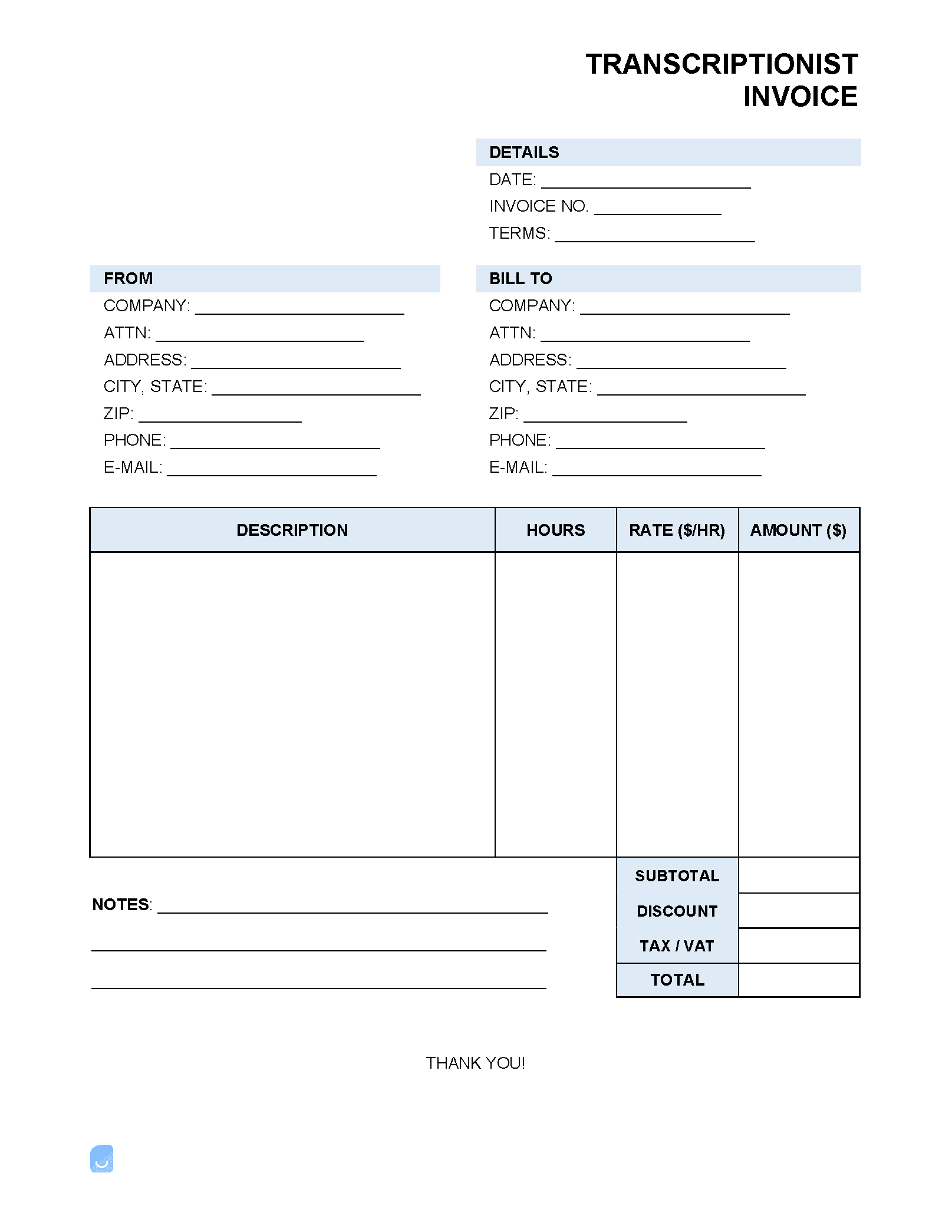Transcriptionist Invoice Template
A transcriptionist invoice is given to customers or businesses after transcription services have been successfully rendered for the client or company. Transcription is charged on a per audio-minute basis, with other rates that can be added-on for excessive background noise, strong accents, multiple speakers, exceptionally complex words, and other factors that can alter the difficulty of the transcription job.
What is a Transcriptionist?
A transcriptionist listens to recorded audio and converts it into text by means of typing or writing. Transcriptionists work in an extensive number of fields, with the most popular being the medical and legal industries. Transcriptionists have strong typing and listening skills to account for fast speaking and the necessity of typing accurately. Transcriptionists can convert any speech into words, with the most popular audio recordings consisting of interviews, manuscripts, speeches, articles, and phone conversations. Transcriptionists are often able to work from the comfort of their home, as audio files can be downloaded via the internet.
Types of Transcription
Medical – Medical transcriptionists take audio recordings that were made by doctors and other health care professionals and turn them into written reports and other administrative documents. Transcriptionists with a medical focus have higher expectations than others and can be expected to hold one (1) or more certifications, understand complex medical terminology, and have an exceptional level of detail to safeguard against grammatical mistakes and other mishaps which can cause serious repercussions. Legal – Legal transcriptionists listen to legal proceedings and other recorded audio files that consist of legalese spoken by attorneys and other legal professionals. Court reporters are very similar to transcriptionists, the major difference being that they record what is happening in a court the exact moment that the words are spoken, in comparison to a recording that transcriptionists use. In addition to converting proceedings, transcriptionists can prepare, proofread, and draft legal documents. Being a professional job, legal transcriptionists are required to have formal education and any accompanying certifications. General – Everything that isn’t in the legal or medical field can be considered as “general transcribing.” This may or may not require official certification or licenses, although acquiring said certification(s) can be beneficial for those applying to open job positions. Industries in which transcriptionists can be found can include:
- Real Estate
- Law Enforcement
- Insurance
- Finance & Banking
- Education
- Energy / Engineering
How to Become a Transcriptionist
For general transcribing, the only requirements may be strong typing skills, a keen ear for listening to obscure and arduous words, and a great work ethic. These are the jobs that often appeal to those that desire to work from home or “test the waters” to see if transcribing is the career for them. For aspiring medical or legal transcriptionists, formal education and certifications should be considered mandatory. A complete list of schools approved by the American Association of Electronic Reporters and Transcribers (AAERT) can be found on their website. The following are a few popular schools and programs that can give students the necessary education for beginning their transcribing career:
- BlueLedge (Approved by the AAERT)
- Legal Transcriptionist
- Cost: $795 (upfront)
- Course length: Six (6) weeks
- Attendance: Online
- Legal Transcriptionist
- Transcribe Anywhere (Approved by the AAERT)
- General Transcription
- Cost: $597 (Level 3)
- Course length: 2-4 months
- Attendance: Online
- Legal Transcription
- Cost: $697 (Level 3)
- Course length: 2-4 months
- Attendance: Online
- General Transcription
- Penn Foster
- Medical Transcriptionist Training
- Cost: $669 (up front) or $739 (monthly auto-pay)
- Course length: Self-paced
- Attendance: Online
- Legal Transcriptionist Training
- Cost: $1,039 (up front) or $1199 (monthly auto-pay)
- Course length: Self-paced
- Attendance: Online
- Medical Transcriptionist Training
- Ashworth College
- Medical Transcriptionist Training (Career Diploma)
- Cost: $649 (up front) or $899 (monthly payments)
- Course length: Self-paced
- Attendance: Online
- Medical Transcriptionist Training (Career Diploma)
- US Career Institute
- Medical Transcriptionist Training
- Cost: $1,239 (up front) or $1,489 (monthly auto-pay)
- Course length: Self-paced
- Attendance: Online
- Medical Transcriptionist Training
Transcriptionist Salary & Hourly Rate ($/hr)
Legal Transcriptionist
- Salary: $34,209/yr (source: ZipRecruiter)
Medical Transcriptionist
- Salary: $34,220/yr (source: BLS)
General Transcriptionist
- Salary: $40,426/yr (source: ZipRecruiter)
